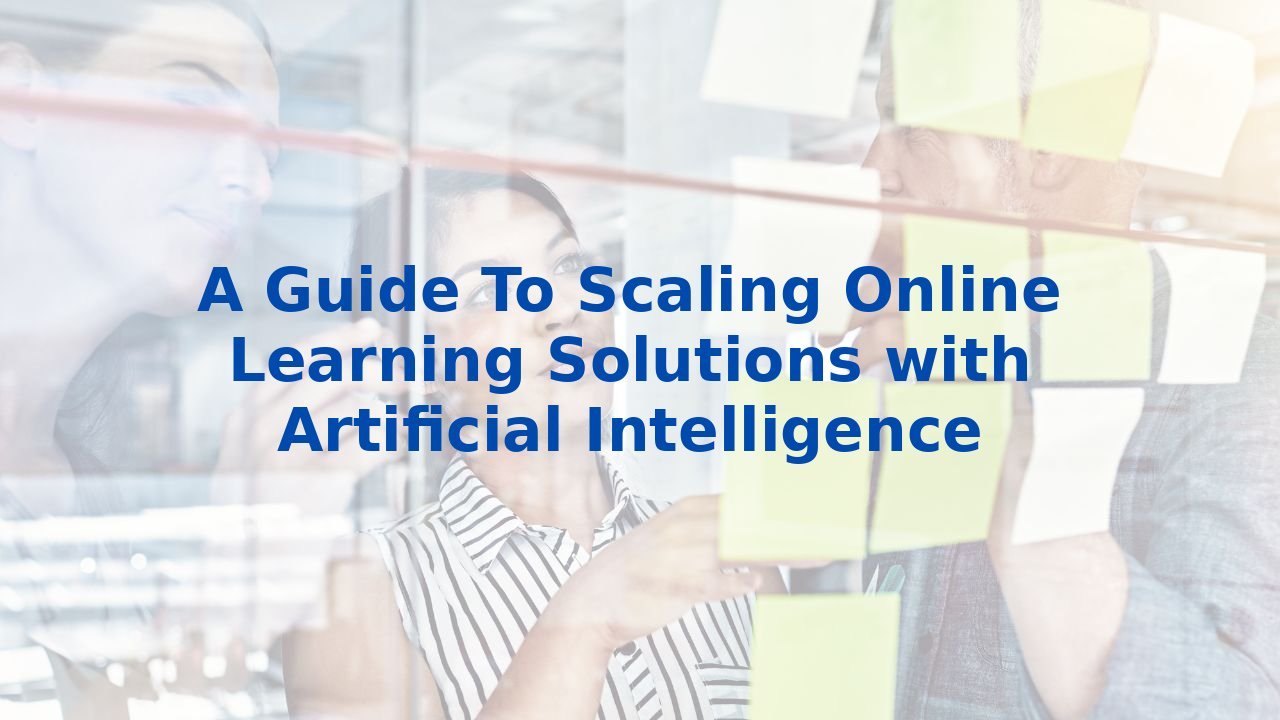A Guide To Scaling Online Learning Solutions with Artificial Intelligence
A Guide To Scaling Online Learning Solutions with Artificial Intelligence
In our contemporary world, the integration of Artificial Intelligence in various business sectors isn't just a trend but a necessity, especially in scaling online learning solutions. With the emphasis on efficiency, personalized learning, and streamlined processes, AI offers organizations remarkable opportunities to enhance their learning systems. This article serves as your compass for understanding how AI can revolutionize online learning programs, boosting productivity and ensuring a significant return on investment.
Transforming the Learning Experience
Traditionally, learning experiences were often one-size-fits-all. But now, AI enables organizations to craft tailored learning pathways that meet individual needs. By analyzing learner behavior and performance, AI can recommend personalized resources, suggest relevant courses, and even predict potential learning challenges. This adaptive learning approach not only engages learners more effectively but also output enhanced retention and application of knowledge.
Streamlining Administrative Processes
Administrative tasks often bog down the efficiency of educational platforms. Whether it’s managing enrollment data, tracking progress, or generating reports, these tasks are crucial yet time-consuming. Here, AI can step in as a game-changer. By automating these processes, organizations can reduce the administrative burden on staff. Consider a scenario where AI automatically updates course materials, enrolls students based on their career goals, and offers performance feedback. This means that educational leaders can dedicate more time to strategy and enhancement of learning rather than dealing with mundane tasks.
Enhancing Content Delivery
Effective content delivery is critical in online learning. AI can optimize this aspect through various means, from simple sentiment analysis of student feedback to more complex prediction algorithms that determine which content formats lead to better engagement. Incorporating machine learning allows for continuous improvement; as data accumulates, platforms can evolve content dynamically based on learner interactions. Imagine creating a system that adjusts its difficulty level based on real-time performance—this is AI in action, creating a truly responsive learning environment.
Fostering Collaboration and Communication
Collaboration often falls by the wayside in online settings, but AI can facilitate better interactions. AI-driven platforms can analyze patterns in communication to enhance group dynamics. For instance, through natural language processing, these systems can provide feedback on how effectively participants engage in discussions. Additionally, AI can foster networking opportunities by matching learners with mentors or peers with complementary skills, thus enriching the learning experience.
Data-Driven Decision Making
With the vast amount of data generated from online learning platforms, organizations can leverage AI for insightful analytics. AI technologies can provide predictive insights, attending to questions like: Which courses yield the best learner outcomes? How can drop-off rates be minimized? This data empowers leadership to make informed decisions that align with both learner needs and organizational goals, crafting pathways for improvement and innovation.
Improving Customer Support and Engagement
Customer inquiries can slip through the cracks in a fast-paced educational environment. AI-powered chatbots can fill this gap, ensuring that learners receive immediate assistance. These virtual assistants can address common questions, guide learners to appropriate resources, and escalate issues to human agents when needed. As a result, the overall learner experience tremendously improves, leading to higher satisfaction rates.
The Importance of Training Your Workforce for AI
While deploying AI tools is essential, reaping their full benefits hinges on how well employees understand and can leverage these technologies. Developing a robust training program centered around AI will empower staff to integrate these tools effectively into their operations. This kind of training includes understanding data input, collaborating with AI solutions, and adapting to new workflows driven by AI insights.
“A well-trained team can turn potential setbacks into opportunities by understanding the strengths and limitations of AI.”
Conclusion: Embracing the Future of Learning Solutions
AI stands poised to revolutionize online learning solutions by enhancing processes, improving personalization, and facilitating data-driven decision-making. By embracing AI, organizations not only cultivate a learning culture powered by intelligence but also ensure they remain at the forefront of educational effectiveness. Scaling these learning solutions through AI is not merely an enhancement; it is an essential step towards thriving in an ever-evolving educational landscape.
For organizations keen on diving deeper into AI applications for workforce training, resources and tailored training programs are available to equip teams with the skills necessary to navigate this transformative journey. Let us embrace AI in learning and turn challenges into milestones for success.



